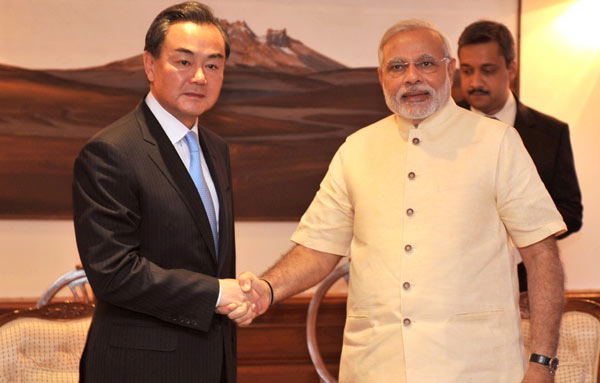Beijing, New Delhi aim to strengthen partnership
By Pu Zhendong (China Daily) Updated: 2014-06-10 09:50
|
 Foreign Minister Wang Yi meets Indian Prime Minister Narendra Modi in New Delhi on Monday. AFP Photo |
The development and revitalization of China and India is an inevitable historical trend, which is also conducive to a more peaceful, harmonious and balanced world, Foreign Minister Wang Yi said during a meeting with Indian Prime Minister Narendra Modi in New Delhi on Monday.
China is willing to work with India to grasp the opportunity to increase mutual trust, expand cooperation and foster a closer development partnership, Wang said.
Wang also met with Indian President Pranab Mukherjee.
As the special envoy of President Xi Jinping, Wang started the two-day visit to India on Sunday when he held talks with his new Indian counterpart, Sushma Swaraj. India called the talks a "productive and substantive" step toward stronger relations between the two neighbors.
Wang's visit heralds a slew of engagements between the two countries in the next six months. Xi is expected to pay an official visit to India later this year at Modi's invitation. At least five other meetings are likely to take place between the two countries at the levels of president, prime minister, vice-president and foreign minister, the Times of India reported.
Observers said frequent meetings between senior Chinese and Indian officials in bilateral and multilateral situations show that the two countries have established a communication mechanism.
Fu Xiaoqiang, an expert on South Asian studies at the China Institutes of Contemporary International Relations, said: "It means relations between China and India have evolved into a mature phase, where both countries manage differences and expand cooperation at the same time."
Wang said India's "Look East" policy and China's accelerating "opening-up to the West" should integrate to facilitate the fusion of markets and a new pole of global growth.
The two countries will also work to advance the Bangladesh-China-India-Myanmar Economic Corridor, which was proposed by Premier Li Keqiang during his visit to India in May 2013.
Fu said the two countries have overlapping areas of interest in development, which should be seen as opportunities instead of competitions.
Ma Jiali, a researcher of Indian studies with the China Institute of Contemporary International relations, said Beijing will forge closer economic links with the new Indian government not just because of Modi's personal style, but also because of the practical demands of the country.
"Nationally, the overall problem with the Indian economy is lack of infrastructure, which tallies with Modi's economic philosophy," Ma said. "His experience in Gujarat to improve infrastructure is expected to be promoted nationwide. And China has its edge in terms of technology and capital."
China is India's biggest trading partner, with two-way commerce totaling nearly $70 billion annually. But India's trade deficit with China has soared to more than $40 billion, local media reported.
Reuters said that the Indian economy grew by 4.7 percent last year, marking the second straight year of sub-5 percent growth and the longest such slowdown in more than a quarter of a century.
Modi has spoken of his admiration for China's economic growth in the past decade. He made several trips to Beijing in his previous post as chief minister of Gujarat state.
Reuters contributed tothis story.
Contact the writer at puzhendong@chinadaily.com.cn
- More female officials caught in corruption
- Whampoa veterans recorded with glory
- Police bust 9 terrorist groups in Xinjiang
- Knife-wielding attackers seized in Xinjiang
- New regulation leads to drop in petitioned cases
- Hunan plant shut as probe into lead poisoning begins
- Police boost efforts to combat gambling
- Project offers jobs openings to legal experts
- Experts: Dog meat festival 'illegal'
- Nation looks to upgrade
pipeline networks






